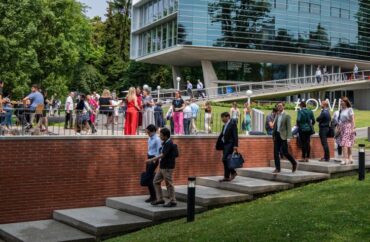
Setting Shell on a path to sustainable transformation in Singapore has required a cultural transformation, says Aw Kah Peng, Chairman, Shell Companies in Singapore. For Kah Peng this has involved fostering collaborative leadership, building trust with both partners and customers, and embracing a learner’s mindset.
Kah Peng, who has been driving Shell’s energy transition in Singapore since January 2019, outlined the company’s global energy transition strategy in a fireside chat with Professor of Digital Strategy, Analytics and Innovation and Dean of IMD Asia and Oceania Misiek Piskorski at IMD’s Orchestrating Winning Performance program in Singapore. She also shared her insights with participants on what it takes to make this level of change possible.
Shell’s Powering Progress strategy
Launched in February 2021, Shell’s “Powering Progress” strategy sets out how Shell will accelerate the transition of its business to net-zero emissions to meet the challenge of climate change. This strategy is aligned with the more ambitious goal of the Paris Agreement – to limit the increase in the average global temperature to 1.5 degrees Celsius above pre-industrial levels.
“Shell’s energy transition strategy is focused on four pillars. The first pillar is generating shareholder value; this is what we do to continue to deliver on the shareholder returns we have promised. The second part of it is what we call respecting nature; it involves how we are considering our impact on the environment. Our third pillar is powering lives; how we contribute to the communities we are part of to ensure that we hear and address their concerns as we transition to a cleaner future. The fourth pillar is achieving net-zero emissions, which is as far as I am concerned, our most important priority,” explained Kah Peng.
Getting to net-zero involves new business models and areas of operation. This has seen Shell cut its crude capacity in Singapore by half in 2021. Instead, it will look to build low-carbon businesses of significant scale over the next decade, with a focus on increasingly offering low-carbon, circular and bio products and solutions, such as biofuels, charging for electric vehicles and renewable power.
“We have grown along with the country, we have been part of Singapore’s economic development for more than 130 years and employ around 3,000 people. For us to go through change is massive because we not only have to rethink how we are set up, we have to find ways to transform a large part of the energy ecosystem we are part of,” said Kah Peng.
Shell’s net-zero target includes not only the Scope 1 emissions, which are directly from its operations and Scope 2, from the energy purchased to run its operations, but also the emissions from the use of energy products it sells (Scope 3).
“The vast majority of our emissions (over 80%) comes from Scope 3. This is the emissions that comes from our customers when they use our products,” said Kah Peng.
Therefore to meet its emissions targets, Shell needs to work with its customers to reduce their emissions too. This involves changing from a product focus to a sector focus as it looks to accelerate the transition of the entire energy system.
A cultural transformation
“I can’t emphasize enough the cultural transformation that we have to put our own organization through to drive a transition of this scale, breadth and depth,” said Kah Peng.
This involves seeking out leaders who are both collaborative and integrative as the company seeks to work more closely with its customers than ever before in meeting and defining their energy needs.
It’s also about building trust with all stakeholders.
“We need our partners and customers to trust that we have their best interests at heart when we say that we want to help them decarbonize. We have to work with governments that are also learning and trying to roll out policies so that we can all work on this together; what is clear is that we can’t do it by ourselves,” explained Kah Peng.
Another important element of enabling sustainable transformation has been embracing a learner’s mindset.
“To enable a transformation, we need a culture where everyone is open to learning and to making mistakes, right up to the CEO level. You can’t ask people to take risks if they are going to be slapped on the wrist for doing so,” she said.
